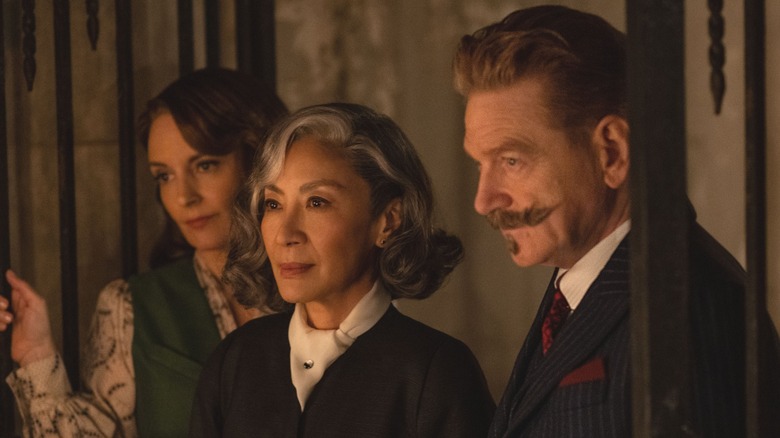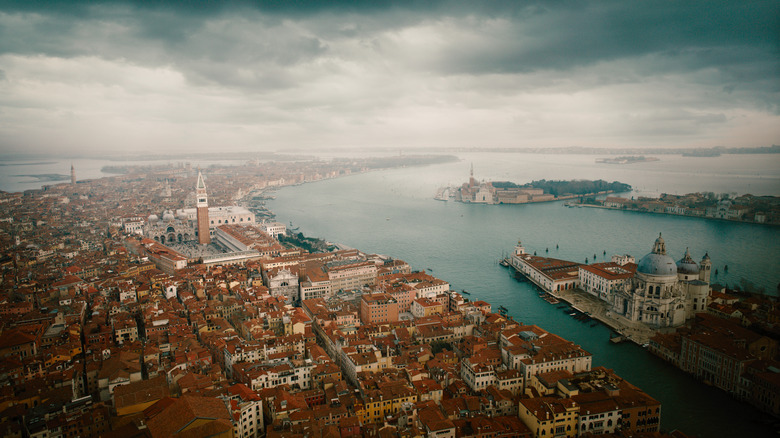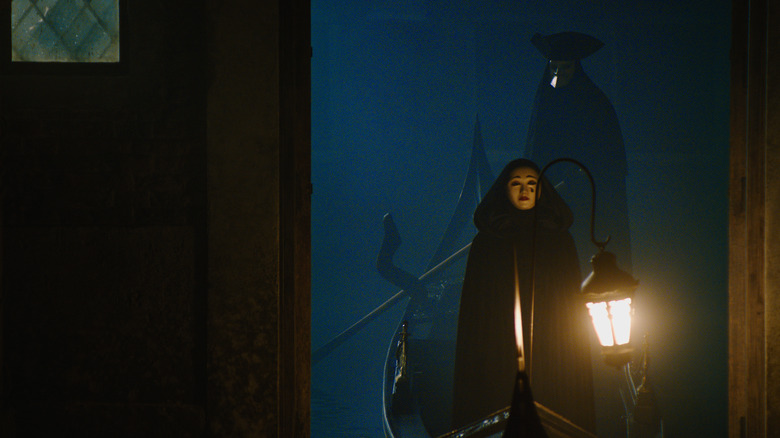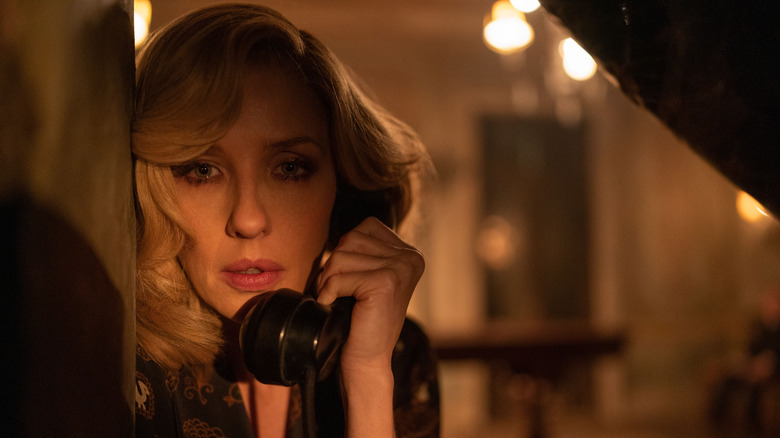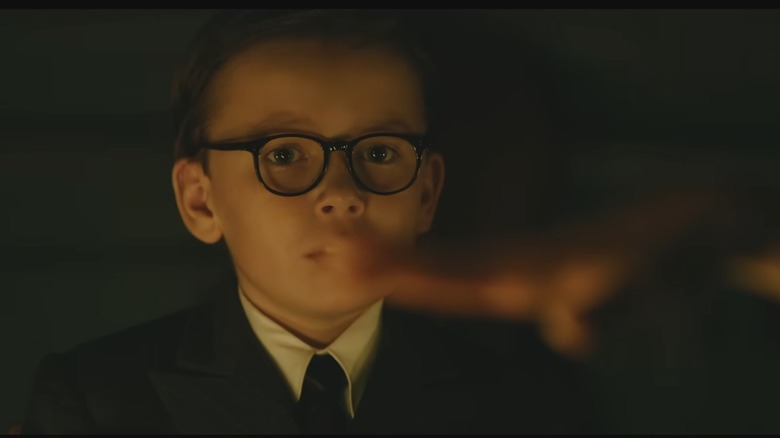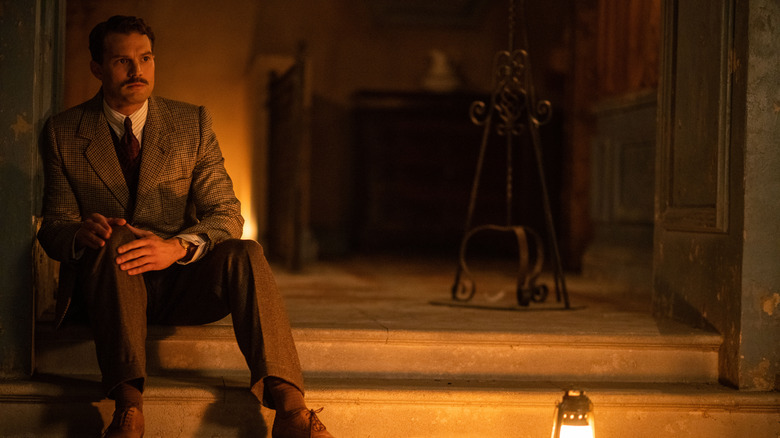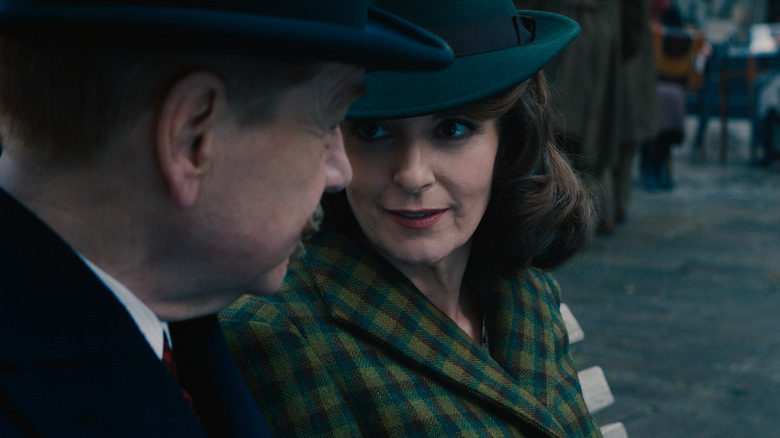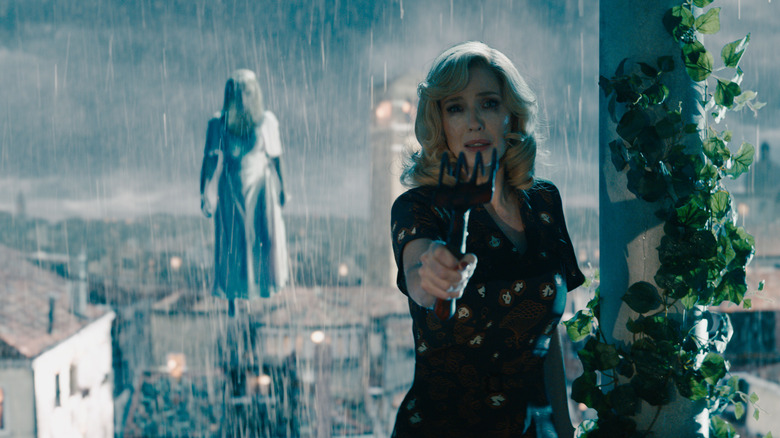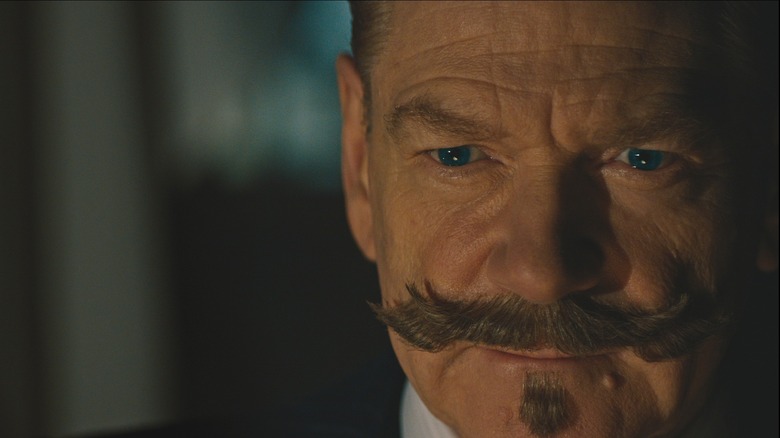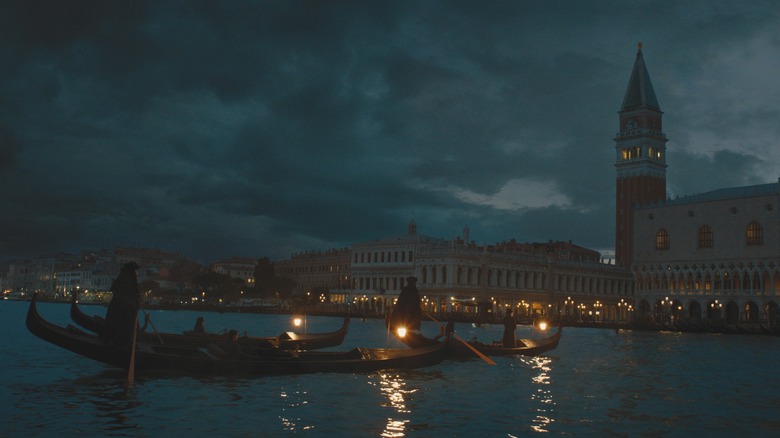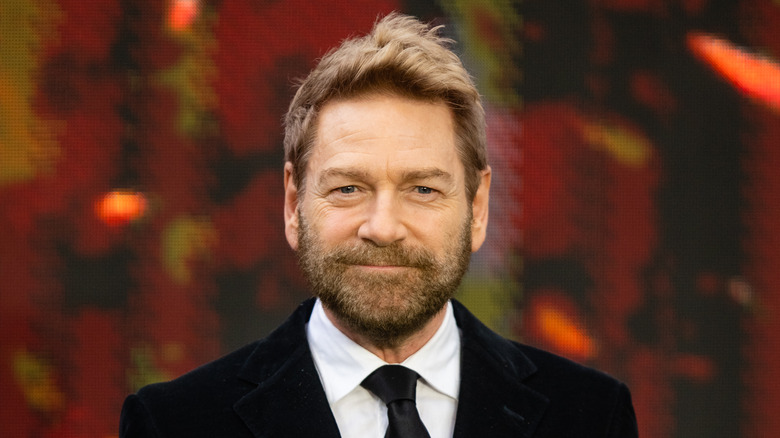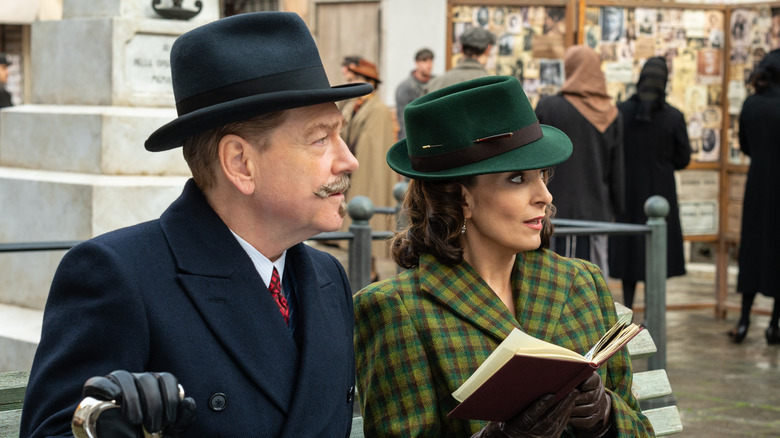The Ending Of A Haunting In Venice Explained
Contains spoilers for "A Haunting in Venice"
"Fear makes people do terrible things." So we are told in the opening act of "A Haunting in Venice," Kenneth Branagh"s latest in his series of Agatha Christie adaptations. Following up on 2017's "Murder on the Orient Express" and 2022's "Death on the Nile," the third film adapts Christie's 1969 tale "Hallowe'en Party," taking far more creative liberty than either of its predecessors. The result is a murder mystery movie that feels both classical and modern, combining elements of horror with classic whodunit tropes.
It may not revolutionize the genre, and it's a far cry from the expert craftsmanship of Rian Johnson's "Glass Onion" and "Knives Out," but "A Haunting in Venice" is still a fun and spooky romp. The stellar cast, led by Branagh's once-again magnificent performance as master detective Hercule Poirot, more than makes up for the nauseating number of Dutch angles he insists on as a director. And it all comes down to a third act full of twists, betrayals, and sad revelations.
"A Haunting in Venice" is more claustrophobic than Branagh's last two Christie mysteries, and you'd be forgiven for leaving the theater a bit confused as to how it all went down. So let's take a look at the film's finale, how every suspect fits into the picture, and what's revealed about the grisly murders at the end of "A Haunting in Venice."
What you need to remember about the plot of A Haunting in Venice
"A Haunting in Venice" begins in, you guessed it, the famous Italian "City of Canals," which is enjoying a much-needed period of peace and healing following the end of World War II. The story takes place in the fall of 1947, as we catch up with a retired Hercule Poirot enjoying his usual vices of walks, pastries, and perfectly prepared eggs. He apparently has no interest in his old profession any longer — until his old friend and mystery writer Ariadne Oliver (Tina Fey) approaches him with a proposition.
Ariadne is attending a Halloween party at a local palazzo where a seance is to take place. The world-famous medium Joyce Reynolds (Michelle Yeoh) has been hired to contact the spirit of the late Alicia Drake (Rowan Robinson), a young woman who seemingly killed herself after a prolonged period of mental illness. Alicia's mother Rowena (Kelly Reilly), her housekeeper Olga (Camille Cottin), family doctor Leslie Ferrier (Jamie Dornan), and Alicia's ex-fiance Maxime Gerard (Kyle Allen) are among the others in attendance.
Per Ariadne's request, Poirot attends the seance to try and prove that Ms. Reynolds is a fake. He identifies some tricks in her act, but things get more serious later that night when the medium is thrown from a balcony and impaled on a statue below. As a storm besieges the palazzo, Poirot locks the gates and begins to investigate. But as he too begins to see ghosts in the supposedly cursed house, he struggles to identify the truth.
What happens at the end of A Haunting in Venice
Poirot's investigation into the deaths of Alicia Drake and Joyce Reynolds leads him to a number of shocking discoveries. He interviews the medium's assistants, half-siblings Nicholas (Ali Khan) and Desdemona Holland (Emma Laird). He also speaks with Dr. Ferrier, who suffers from debilitating PTSD, and his creepy son Leopold (Jude Hill).
As tensions rise, Dr. Ferrier falls into a violent episode and is subsequently locked in the palazzo's nearly soundproof music room for the supposed safety of all involved. Following this incident, Poirot deduces that his friend Ariadne was actually in cahoots with Ms. Reynolds the whole time. Along with Poirot's bodyguard Vitale Portfoglio (Riccardo Scamarcio), who's revealed to be the police officer who found Alicia's body, Ariadne helped Ms. Reynolds and her assistants rig all the tricks for the seance. Her goal was to stump Poirot and make him admit to the medium's powers, leading to a hit book about Ms. Reynolds that would bring Ariadne back to the top of the literary establishment.
But as this interrogation is happening, Dr. Ferrier is found dead. The legend of the palazzo says that it's haunted by the ghosts of orphan children who were killed by brutal doctors and nurses in the past. Since Ferrier is a doctor, some assume that his death is proof of the supernatural, but Poirot has another explanation. He reveals that the grieving mother Rowena Drake is actually the one responsible for the whole bloody affair.
A mother's twisted affection
We're told at the start of the movie that Alicia Drake suffered from a psychological illness after being dumped by Maxime. She claimed to see ghosts in the house, but in reality, her affliction was quite human. Jealous and terrified of losing her daughter to a husband, Rowena caused the split between Alicia and Maxime and concocted a plan to keep her daughter by her side in perpetuity. Using a special poison grown in her honey garden, she kept Alicia sickly and sedated by spiking her tea.
When Olga volunteered to watch Alicia for the night, she unknowingly gave her a fatal dose of the drug. To cover up her evil deed, Rowena threw her daughter off the balcony and left the mark of the "Children's Vendetta" on her, invoking the supposed curse. It's a despicable, almost unthinkable crime — she may not have meant for Alicia to die, but she put all the pieces in place and willingly harmed her for weeks, purely out of jealousy.
Poirot discovers that Rowena is being blackmailed by someone who knows her secret. After the seance, she kills Ms. Reynolds and changes one of the clocks to give herself an alibi — possibly because she suspects that the medium is the blackmailer, or possibly because she fears that a second seance will uncover the truth. At the end of "A Haunting in Venice," it's revealed that the medium was running an entirely separate con. The initial blackmail came from a much less obvious place.
A precocious child gets in over his head
For a moment, Poirot suspects that Dr. Ferrier was blackmailing Rowena — the woman he loved but who never returned his affections. After all, he should have seen from his autopsy of Alicia that she died from poison, not drowning. However, the doctor's declining mental condition caused him to miss the obvious. Or maybe he was blinded by love. Whatever the reason, he didn't see it, but his precocious son did.
Knowing that his father couldn't work anymore because of his condition and deducing what really happened from the autopsy notes, Leopold undertook the blackmail to provide for himself and his dad. After his father's death and the resolution of the case, the boy is taken in by Olga. He laments what happened, but Poirot assures him that it isn't his fault. No child should have to be a parent to their parents, but the scars of the war forced him into an impossible position.
Rather than keep the remaining blackmail money, Leopold and Olga decide to give it to Nicholas and Desdemona so that they can travel to St. Louis, as is their dream. It's nice that a little bit of good comes out of the whole ordeal, but the night at the palazzo is still a dark one.
The things we do for love
One of the more perplexing twists in "A Haunting in Venice" is the death of Dr. Ferrier, which is explained by Poirot as an elaborate manipulation by Rowena Drake. The combination of intense PTSD and unrequited love for Rowena leaves the doctor in a highly vulnerable state, and she convinces him over the inner-house telephone to kill himself, making it look like a supernatural event — after all, the ghosts hate doctors, right?
But why exactly does she do this? The movie doesn't make it entirely clear, but there are a few different motivations that all play a factor. Rowena is clearly paranoid about her blackmailer, terrified that someone in her midst knows the horrible things she's done. Perhaps she thinks it's the doctor conducting the blackmail, since he was the one who performed the autopsy, or maybe she simply fears that he will return to his notes after all of the commotion and unearth the truth. Regardless, his isolated death makes a strong case for the ghosts being real, which would theoretically absolve Rowena of all culpability.
Because of Leopold, the doctor's death is perhaps the saddest in the whole film. The boy tries so hard to care for his father in a world that's utterly unprepared to deal with the mental effects of the war. When he sees him lying dead, all he can say is, "Why did he have to be alone?" It's a heartbreaking moment.
If you or someone you know is struggling or in crisis, help is available. Call or text 988 or chat 988lifeline.org
The desperation of a failing author
Ariadne Oliver isn't guilty of murder, but she is caught in a less-than-admirable scheme by Poirot. Though they're friends, she tries to use him as a tool in her literary comeback, even bringing his bodyguard into the plan to help make Ms. Reynolds seem legit.
At the beginning of the movie, she tells Poirot that her last three books have been critically panned — her only three not to become bestsellers. She also claims to be the one responsible for making him famous in the first place, as she wrote up a case of his years before. For this reason, she argues that she has every right to use him. And while the two don't exactly part on the best of terms, Poirot doesn't seem to hold a grudge against her for the manipulation.
Ariadne is a mainstay of Agatha Christie's fiction and frequently served as a stand-in for the author herself. Her arc in "A Haunting in Venice" is a good deal different than her role in "Hallowe'en Party," but there is an interesting connection. The novel received generally negative reviews upon release and was written off by many as proof that Christie was well past her prime as a writer. That reception may have been overly harsh at the time, but it's interesting to see Ariadne dealing with a similar dilemma in "A Haunting in Venice."
Are the ghosts real in A Haunting in Venice?
After Poirot catches Rowena in her lies, she confronts him on one of the balconies of the palazzo. As the storm rages behind her, Poirot catches a glimpse of what appears to be a ghost in the lightning — the shape of Alicia, hanging in the air, looming behind her mother. In the next moment, Rowena loses her balance and plummets off the balcony to her death. The audience and Poirot are left to ponder if she was pulled by a specter or simply blown off by the wind.
Poirot discovers that his own hallucinations throughout the movie were caused by Rowena's poisonous honey. That's why he had trouble speaking and heard voices around the house. Or is it? Leopold repeatedly says that he talks to the ghosts of children in the palazzo. Some of them, he claims, are even his friends. As the one blackmailing Rowena, he has no reason to think that Alica's death was supernatural, but he insists — with what seems like a clear, sharp, albeit young mind — that the haunting is real.
Is Poirot still being affected by the honey when he sees Rowena fall, or does he actually spy a ghost on the balcony? We don't get a concrete answer, but the secret basement of the palazzo confirms the evil deeds and numerous deaths that took place there. Even Poirot can't explain the whole thing.
Knowing that death is coming, how do we choose to live?
Though he solves the case and puts the spirits to rest, so to speak, Poirot leaves the palazzo the next morning a seemingly changed man. He has a new fire in his chest for detective work and immediately returns to it, accepting a case proposed to him in the film's opening scene. So what changed? Why does a man so firmly in retirement leap back to his old job after his experience at the palazzo? Maybe it's because this particular brush with death makes him reexamine how he wants to live.
At the beginning of the film, Poirot openly admits that he has no friends. He doesn't say this sadly, but it's hard to imagine that solitude is always a good thing for him. "We know the dead too well, I think," Ms. Reynolds says to Poirot at one point. Though her own powers as a medium are left ambiguous, Poirot seems to take her statement to heart.
His line of work is not a happy one, but it is a calling, and he returns to it at the end of "A Haunting in Venice" with renewed vigor. He still may not openly admit to believing in a soul or a god, but he seems decidedly driven to start actively living again.
A Haunting in Venice is a postwar story
"A Haunting in Venice" is a murder mystery and a ghost story, but it's also a movie about the aftermath of World War II. By moving "Hallowe'en Party" from its original English setting to Italy in 1947, Kenneth Branagh and screenwriter Michael Green reorient the focus of the narrative.
Dr. Ferrier suffers because of the things he saw in the war, and this psychological wound causes him to misdiagnose Alicia's cause of death. Because of his PTSD, his son is forced to grow up extraordinarily quickly and become the adult in the family. This pushes him to make the questionable decision of blackmailing Rowena instead of coming forward with evidence against her. But with his father unable to work, what choice does he have?
The Holland half-siblings are also scarred by the war. They want to go to St. Louis because they saw it in a movie shown to them by the American soldiers who saved their lives. Their whole conception of a happy life is determined by their horrific experiences in a war-torn Europe, of which Venice is still a part. There are ghosts in the palazzo — allegedly — but there are bigger ghosts that haunt the story. Venice, Italy, and the world at large are trying to pull themselves together after an unfathomable amount of violence. The movie's haunted style makes this theme both literal and metaphorical.
What Kenneth Branagh has said about the end of A Haunting in Venice
Due to the Hollywood labor union strikes, which prohibit writers and actors from marketing upcoming projects while SAG-AFTRA and the WGA fight for more equitable pay and working conditions, there hasn't been much promotion from the cast and crew of "A Haunting in Venice." However, back in April, before either strike had begun, Kenneth Branagh did speak with The Hollywood Reporter about the film.
Discussion of the movie's ending wasn't on the table, as murder mysteries rely on keeping all their twists under wraps. However, Branagh did suggest some interesting things about potential sequels. When asked if he'd faced studio pressure to unite his Poirot films under a single franchise title for marketing, Branagh said no. "Not thus far, no," Branagh responded. "I haven't been asked to do that." His use of "thus far" suggests that the director and star has plans for even more Agatha Christie mysteries, which he seemed to confirm later on.
"The movies are what they are, and if it evolves in a different way, we'll cross those particular bridges when we come to them," Branagh said. "But so far, I've just been left to get on with the titles as they are." That certainly leaves the door wide open for more Poirot cases on the big screen, provided "A Haunting in Venice" performs well enough to justify them.
What the ending of A Haunting in Venice could mean for the franchise
Kenneth Branagh isn't the only one who sounds optimistic about more Poirot mysteries coming down the line. Prior to the release of "A Haunting in Venice," executive producer James Prichard spoke with Total Film about the possibility of more sequels set in Agatha Christie's mystery universe. "If Ken [Branagh] wants to do more, and Michael [Green] wants to write more, we'll certainly do another," Prichard said. "There's a lot of material still to go, so we're not going to run out of inspiration."
With Christie's whole library available for potential adaptation, Branagh's series could indeed go on for as long as he wants, provided the box office returns are there. However, Prichard — Christie's great-grandson and CEO of her literary estate — emphasized that it's also important to keep things fresh, saying, "If we are going to continue to make these films, we can't do the same thing over and over."
"A Haunting in Venice" is definitely a bit of a shift, throwing the story more into the supernatural thriller category than that of a traditional murder mystery. But Poirot has a renewed vigor for investigating mysteries at the end of the story, and it would be great to see Tina Fey return as Ariadne Oliver in the next movie too. If audiences respond well to the film and its many changes to Christie's work, future sequels could get even more creative and unique.
